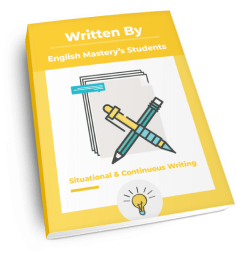
An Ultimate Guide to Using Informal and Formal Tone
A few days ago, someone we know landed in some trouble with her supervisor for using informal language in an email sent to the higher-ups in her company. Instead of saying that she would like to “invite them to a lunch” organised by her supervisor, she asked if they would like to “come along.” Yikes.
Her informal tone was grating and was interpreted as unprofessional, causing her to receive an earful from her supervisor.
Today, we would like to share some tips with you about how to identify formal and informal language and tone. After that, we’ll share some examples that you can keep in mind, using questions the 2017 and 2018 O Level English examination paper.
Features of Formal and Informal language
We’ll focus on four differences between formal and informal language:
- Contractions
- Phrasal Verbs
- Colloquialisms
- First and second-person pronouns
For convenience’s sake, remember that these features are present in informal language but not formal language.
1. Contractions
Contractions are words that have been shortened or combined. Here are some examples:
Informal → Formal
He can’t. → He cannot.
He won’t. → He will not.
He’s eaten. → He has eaten.
2. Phrasal verbs
Phrasal verbs are phrases that comprise a verb and one or two prepositions. Some examples of phrasal verbs are “stand by,” “work out” and “show up.”
He will stand by her. → support
They work out daily. → exercise
She shows up for violin lessons regularly. → attends
3. Colloquialisms
Colloquialisms are essentially informal words, phrases or even slang that is used in everyday conversation but are not suitable in formal settings. Take a look at some of the examples below.
He bamboozled the crowd and escaped with the money. → deceived
Maria heard the rest were headed to the mall and said that she was in.→ shopping centre → wanted to go too
4. First, Second and Third-person pronouns
First-person pronouns include “I”, “me”, “my” and “mine” while second-person pronouns are “you,” “you,” “your” and “yours.” These pronouns establish a sense of familiarity between the writer and the readers, making them more suitable for informal pieces.
Third-person pronouns include ‘they,’ ‘them,’ ‘their’ and ‘theirs’ but also includes more generic terms like ‘students,’ individuals,’ ‘society’. Using third-person pronouns shows the writer’s ability to analyse an issue from a bird’s eye view, making it appropriate for formal settings. Consider the following examples:
In this article, I will explain how you can differentiate informal and formal language.→ From this article, students will learn how to differentiate informal and formal language.
Using formal language would make your writing sound a bit more serious or distant while the use of informal language represents light-heartedness and familiarity. Before deciding which tone to adopt, we should be aware of the purpose behind the written task.
The English Examination
When it comes to Situational Writing (30 marks, Paper 1, Section B), we need to keep in mind whom we are writing to.
As for Continuous Writing (30 marks, Paper 1, Section C), one misconception is that formal writing is necessary for all question types but this might not necessarily be the case. Understanding the goal of the essay would help you to decide whether you should lean towards formal or informal writing. In this article, we will draw from the following questions to exemplify the differences between formal and informal language:
- 2017 O Level Situational Writing (Paper 1 Section B)
- 2018 O Level Situational Writing (Paper 1 Section B)
- 2018 O Level Continuous Writing (Paper 1 Section C)

In the 2017 O Level Situational Writing question, you are expected to write to your older brother who has offered to purchase a gift for you to help with your fitness journey. Now, the fact that you are writing to your brother already implies that there is a great deal of familiarity between the two of you. As such, an informal writing style might be more suitable. It would certainly be more realistic.
Model Example:
I’m thrilled that you’ve sent me these amazing choices to choose from. It was pretty difficult to choose at first. I thought about it for a while and now, I’m all for the gym membership.
In the example above, we use both first and second-person pronouns, contractions as well as a colloquialism (“all for”) to inform the ‘brother’ of the choice. Here, the use of informal language is reflective of the close relationship shared with the brother.
If we take the 2018 O-level Situational Writing question into account, however, we would need to write differently. In the 2018 paper, you are expected to write to your Principal to express your view about a new facility on the school site. Take a look at the following inappropriate example:
Inappropriate Example:
I’m absolutely excited that you’ve allowed us to choose between these awesome choices. While everything looks great, my money is on the Performance Arts Centre.
Don’t you think this comes across as too personal and it is almost as though this were written for a father, instead of a Principal? The use of informal language here conveys the wrong impression and, in an exam setting, would convey to the marker that you do not know how to differentiate between situations that call for formal and informal language.
To change this to a formal one, let’s use third-person pronouns and remove the contractions and the colloquialism.
Model Example:
It is indeed a privilege to be able to choose amongst the three shortlisted ideas. While all the ideas have merit, the best choice seems to be the Performance Arts Centre.
This comes across as a bit more serious and mature which is the appropriate tone to adopt when writing to someone in a position of authority.
The Key
Therefore, for Situational Writing tasks, the key lies in understanding the relationship you share with the intended audience. A speech directed at your classmates would be more informal than a speech for the whole school, where teachers and school leaders are present. Even in an informal situation, writing a letter to your cousin would be more informal than if you were writing a letter to your aunt.
Generally, for recipients who are older or in more established positions than you, it would be ideal to convey a sense of respect and maturity through the use of formal language.

Identifying the extent to which you should use formal language in the Continuous Writing section is slightly more complicated. Essentially, you should look at the question and understand the purpose behind it. Let’s take a look at the following question.
‘I had never seen my friend laugh so much!’ Write about a time when this happened. (2018 O Level Paper 1 Question 2)
This is a personal recount question that requires you to elaborate on an incident that occurred between you and a friend. We would want to make this ‘friend’ a close friend, so that the story might come across as more entertaining. As such, we would want to inject this piece with informal writing to realistically portray the close relationship shared with the friend. Imagine saying this to a close friend:
“Hello. May I ask why you are laughing to this extent?”
This sounds too unnatural, as though you were trying to make small talk with someone unfamiliar. Adopting an informal tone in this case would make this sentence sound a lot more natural.
“Hey! Whoa, why are you laughing so much?”
See? Now, the line reads a lot smoother. Using a colloquialism like “whoa” also gives me room to inject surprise, which was much more muted, or absent even, in the formal example.
Does this mean that you can never use formal language in a conversation with a friend or a classmate? Not at all. All this means is that you need to think about why you are using such language.
If you decide to write a story about a classmate whom you have not spoken to much before but one day, saw him laugh so much that you became better friends after that, then the use of formal language at the start would not be out of place. However, to signify the budding relationship at the end of the story, you might chose to shift your tone towards informality as you move through the essay.
For questions that are more argumentative or expository in nature, you should choose to be completely formal.
Some people like to stand out from the crowd; others just want to be a part of it. Which do you prefer and why. (2018 O Level Paper 1 Section C Question 4)
The above question is a mixed genre question where you are required to explore the issue of standing out or assimilating into a crowd while allotting at least one paragraph to explain what your preference is.
Even though your personal input is required, the purpose of the essay itself is for you to describe and explain the phenomenon of different people choosing to behave in different ways. Addressing the reader with second-person pronouns and using colloquialisms would take away from the seriousness of the task. Imagine writing like this:
“All of us behave differently in crowds. You might like to stand out from the crowd because of the benefits afforded to you but others might not.”
Using second-person pronoun in such instances comes across as dismissive and rude. In doing so, you are making assumptions about what the reader believes, when it might not be true. Opt for a more formal third-person approach instead:
“Individuals behave differently in crowds. Some prefer to stand out from the crowd because of the attached benefits while others might not.”
By using third-person pronouns, we’ve added some distance between ourselves and the topic. This makes the writing sound less personal, more objective and much more appropriate for the task at hand.
To wrap up
In summation, it is important to be careful about when you use formal and informal language. Understanding the purpose of the task and the intended audience would go a long way in helping you to do so. We have a question for you, though. What style of writing have we used in writing this article? More importantly, why do you think that is? 😉




